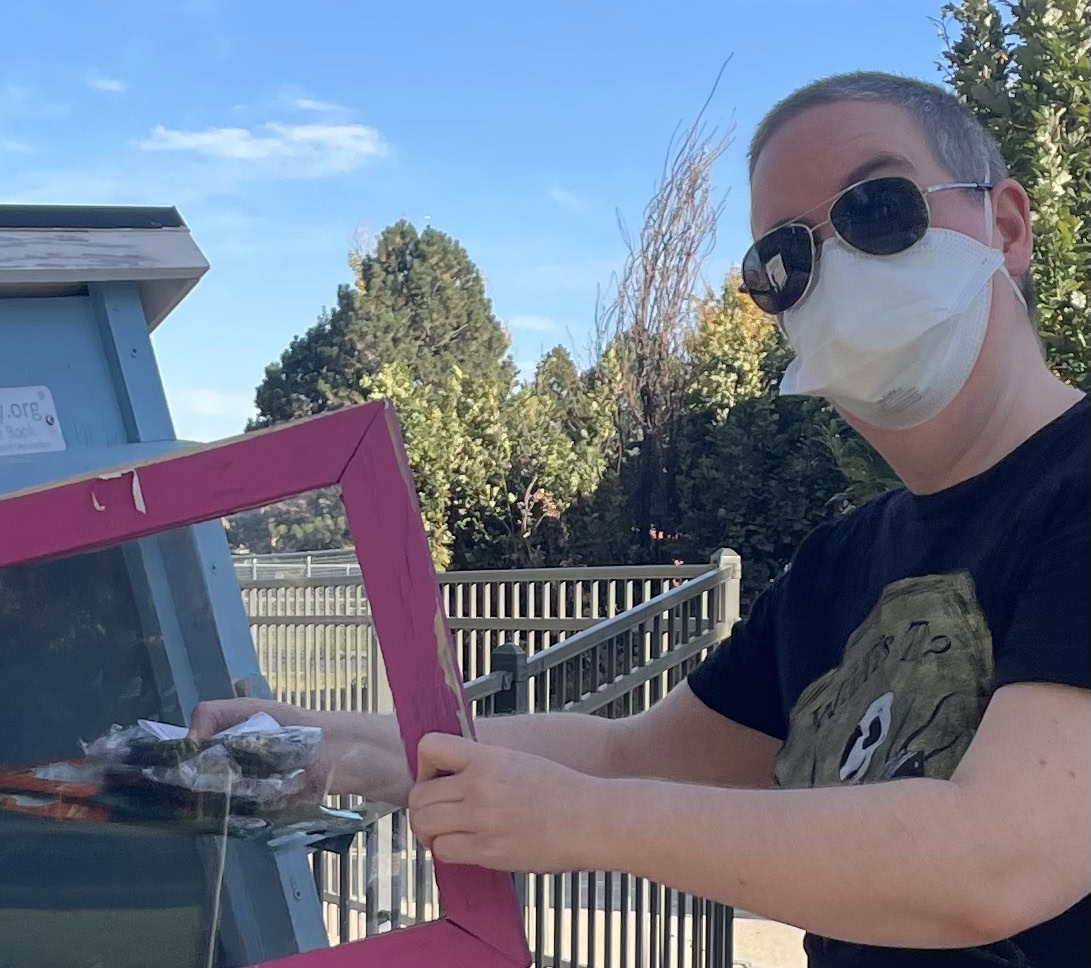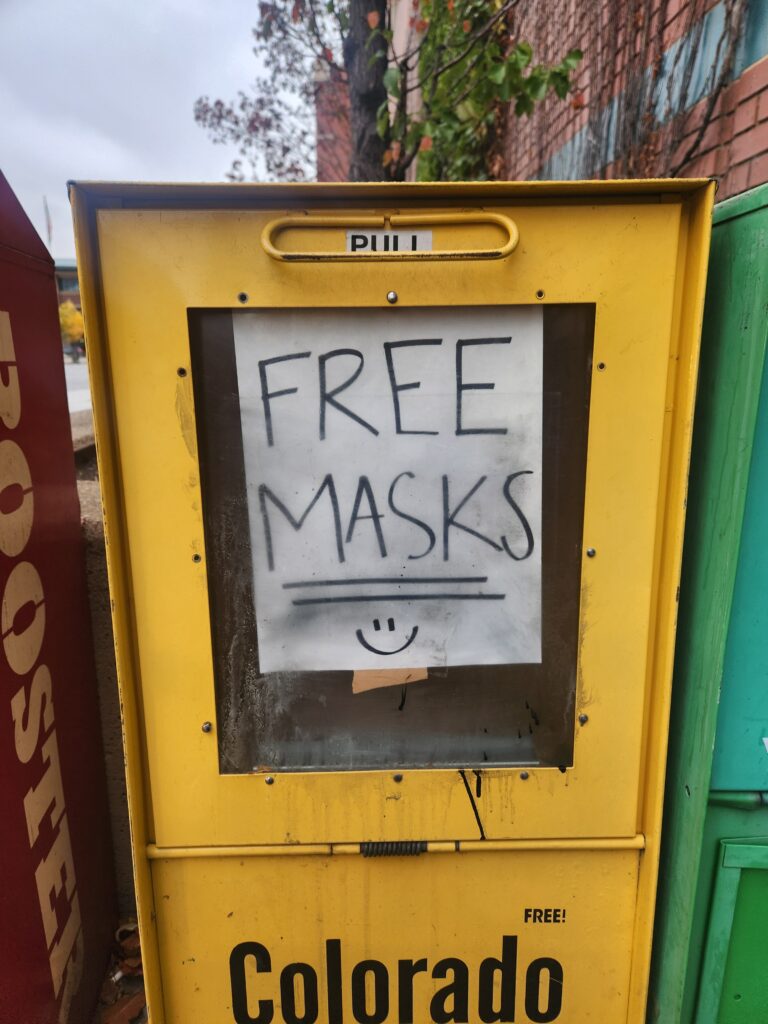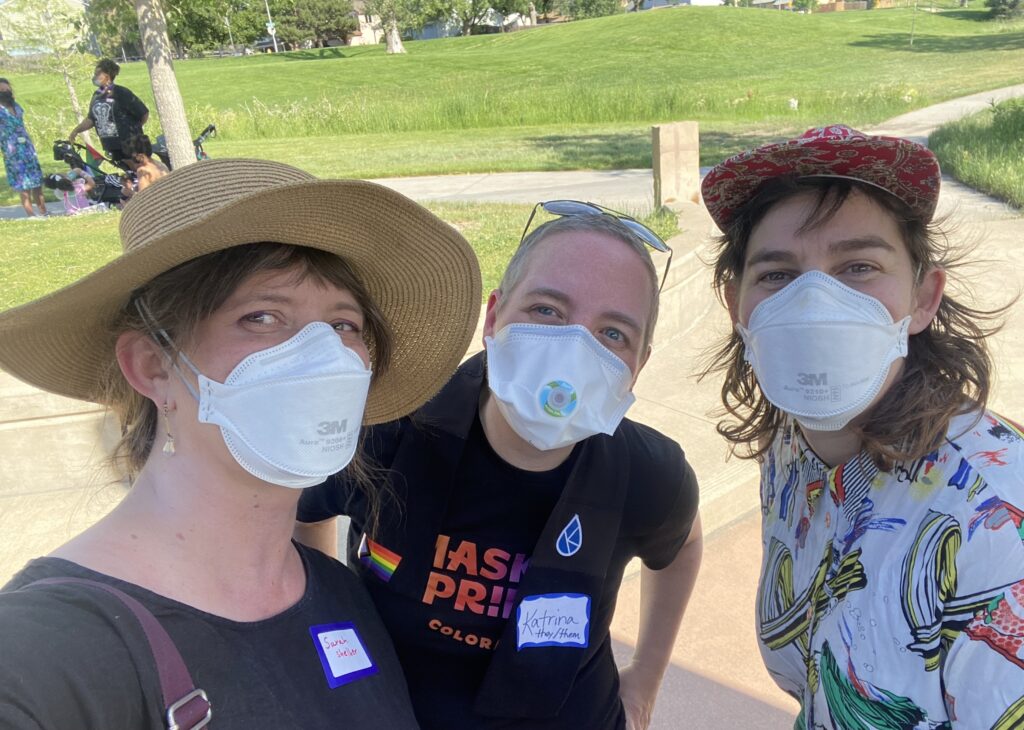
Katrina Dreamer is tired. Tired of asking friends, family, even their doctor, to wear a mask.
“My doctor refused to wear a mask for me,” they said. “Like, my doctor. How am I even saying that sentence?”
Few Americans are still masking, and most believe we are in a post-pandemic era. Not Dreamer — or the small contingent of Coloradans who bill themselves as COVID-cautious, or COVID-informed. They are individuals who have stepped into the role our governments once played, distributing protective equipment and warning the public of a rise in cases.
It’s no easy task.
“The early days of the pandemic were really hard for everybody, and I can understand the tendency to not want to look at that anymore,” Dreamer said. “But there are millions of people who can’t avoid it.
“Immunocompromised, chronically ill, disabled people are everywhere. I’m there; I need people to do what they can to protect me.”
‘Failure of public health’
In 2024, 44,620 people died from COVID in the U.S., according to Centers for Disease Control (CDC) data through Dec. 7. There were two waves of 1,000-plus deaths per week — the January peak topped 2,500.
That’s a fraction of the all-time high in early 2021. A decline in cases and the eroding government support for testing, tracking and masking has led to a worrisome complacency among the public, Dreamer said.
President Joe “Biden declared the public health emergency over in 2023,” they said, “but not the pandemic.”
Test positivity — an indicator of how much the virus is circulating among a population — remains over 5%. During the height of the pandemic, health officials considered a 5% positivity rate too high for lifting government restrictions.
To “counter the failure of public health,” Dreamer and four others organized themselves into Covid Safe Colorado (CSC), the state’s only mask bloc — mutual aid groups that provide protective equipment, tests and information to their communities for free. There are dozens across the U.S., but blocs are scarce in the Rocky Mountain region.
CSC has distributed 26,000 masks and 3,000 rapid tests throughout the state. They also try to counter misinformation and malaise among the general public.
“With that push to get back to normal, it has become very individualistic, ‘you-do-you,’ assess your own risk approach to the pandemic,” said activist Anna Estes. That is “very dangerous” for people who are more vulnerable to COVID.

According to a 2022 metastudy of COVID transmission, 44% of cases spread asymptomatically.
“The messaging is that if you’re vaxxed, you’re fine,” Dreamer said. “But you may be walking around and giving it to somebody like me who will be extremely affected by it.”
To Estes, masking is a disability rights issue and a social justice issue. She attended a few CSC events and then, using her own money, funded a mask drop in downtown Boulder. The handmade pamphlets that accompanied them included information about COVID, masking and disability justice. A link to Estes’ Venmo account sits right below this attribution: “This pamphlet was created by one very passionate (and very tired) queer, trans, disabled person.”
She likens the current state of COVID to the HIV/AIDS crisis of the 1980s and ’90s, when health authorities and government officials did not take action because the virus was associated with marginalized groups.
“There’s this message [that] it was a pandemic of the vulnerable,” Estes said, “that ‘only’ the elderly or disabled people were going to be negatively impacted.
“It’s ultimately a sign of ableism and really some eugenicist aspects of our society that we have so widely accepted that any of these deaths are acceptable.”
‘We have to keep resisting’
For Nancy Harrison, the choice to mask is partially a financial one. She runs Functional Physical Therapy in Gunbarrel with her partner Ken. When she got COVID in March 2020, the clinic shut down for two weeks. When she and Ken got it a second time this past summer after traveling for her father’s funeral, the practice stayed closed for three weeks.
“Both had significant financial impact,” Harrison said. “Whether it’s COVID or something else, I miss work when I’m sick, and that gets expensive.”
Everyone who comes in is required to wear a mask, and Harrison herself sports a KN95 every day. Harrison sees it as necessary to protect herself and her patients — some of whom are immunocompromised.
“I see between 40-50 people a week,” she said. “That’s a lot of exposure at a very close contact for extended periods of time.”
“Masking is a workers rights issue,” Dreamer said. “So many workers are getting long COVID — they lose basically everything.”
In partnership with Project Protect Food Systems, CSC is fundraising to purchase protective equipment — masks, boots, gloves — for farm workers who are vulnerable to COVID and H5N1, colloquially known as bird flu.
“Farm workers are kind of at a unique risk because of how employers can exploit their undocumented status” and limit the information they get about health concerns, Dreamer said.
‘I lost so much’
A recognition of shared struggles is key, Estes said, particularly because vulnerability to long COVID intersects with race, age, class, gender and ability. “Pretty much any marginalized group you can think of in society is probably going to be disproportionately affected by COVID for reasons that are likely systemic.”
Mask blocs and mutual aid are generally intersectional. For Dreamer, the community they found has been almost as important as the activism.

“Most of us are disabled in some way or neurodivergent, most of us are queer and trans, and we’re tired,” they said. “We couldn’t do it alone anymore.”
CSC tries to host one virtual and one in-person event each month. A support group meets weekly.
“A lot of us have a lot of sadness over what we’ve lost,” Dreamer said. “I lost so much community, I lost most of my close friendships. I needed to build a community that understands, that can be a place I can not have to push so hard for mitigations. I would prefer to be around people who just know and just show up in a mask.
“That is one of the biggest things I hear from other COVID-cautious people. They just feel alone; their wider circle of people don’t get it or have moved on and don’t care anymore.”
Learning about historic queer activism has given Estes “a source of hope” and the fortitude to continue organizing — for this pandemic and the next.
“We still have to keep resisting,” she said, “keep taking care of each other.”
“Most of us aren’t doing it because we super enjoy it,” Dreamer added. “We’re doing it to stay alive.”
